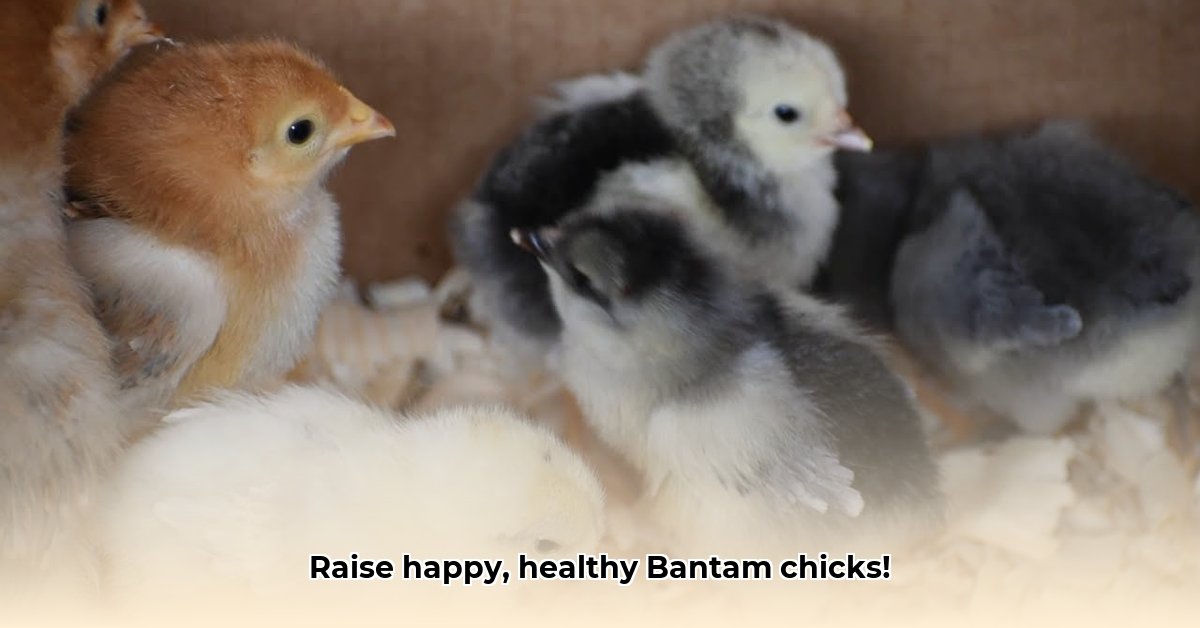
Ready to embark on a rewarding journey of sustainable farming? Raising bantam chicks from Tractor Supply offers a fantastic opportunity to enjoy fresh eggs, charming feathered friends, and a deeper connection with nature. This comprehensive guide provides actionable steps for success, even for first-time chicken keepers. For more information on Cornish Cross chicks, check out this helpful resource.
Choosing Your Bantam Breed: Finding the Perfect Fit
Selecting the right bantam breed is crucial for a successful and sustainable operation. Tractor Supply offers various breeds, each with unique characteristics. Consider these factors:
- Egg Production: Some breeds are known for their prolific egg-laying, while others prioritize meat production or ornamental qualities. Research breeds like Leghorns, renowned for high egg output.
- Climate: Choose a breed that thrives in your specific climate. Some breeds are better suited to cold weather than others.
- Space: Consider the space available in your coop. Some bantams are more active than others. Overcrowding leads to stress and reduced egg production.
- Temperament: Bantam breeds vary in temperament. Some are friendly and social, while others are more independent. Choose a breed that aligns with your preferences and experience level.
Actionable Step: Research bantam breeds available at Tractor Supply, considering your climate, space, and desired egg production. Consult online resources and breed descriptions to make an informed decision.
Housing Your Bantam Flock: Building a Thriving Environment
Providing suitable housing is fundamental to your bantams' health and well-being. Your coop should offer:
- Protection: Shielding from predators, harsh weather, and other hazards.
- Ventilation: Good air circulation prevents ammonia buildup, a significant health risk.
- Space: Adequate space for each bird to move comfortably. Overcrowding stresses birds and reduces egg production. Aim for more space than you think necessary.
- Cleanliness: Regular cleaning prevents disease and keeps your birds healthy.
Actionable Step: Design or purchase a coop that meets your bantam's needs, ensuring adequate space, ventilation, and predator protection. Regular cleaning is crucial for disease prevention.
Feeding Your Bantam Chicks: A Nutrition Plan for Success
Proper nutrition is vital for healthy, productive bantams. Follow these guidelines:
- Starter Feed: Begin with a high-quality chick starter feed, formulated for their nutritional needs during their first few weeks.
- Adult Feed: Transition to an adult feed once they mature. Tractor Supply offers various options.
- Supplements: Offer occasional treats like mealworms or small amounts of healthy kitchen scraps. Always provide fresh, clean water.
- Sustainable Options: Consider locally sourced, organic feed options to minimize your environmental impact and support local agriculture.
Actionable Step: Purchase high-quality chick starter and adult feed from Tractor Supply. Supplement with occasional treats, ensuring access to clean water at all times. Explore sustainable feed options if possible.
Disease Prevention: Keeping Your Flock Healthy
Proactive disease prevention is crucial for a thriving flock. Implement these strategies:
- Cleanliness: Maintain a clean and well-ventilated coop to prevent disease.
- Biosecurity: Prevent contact with wild birds or other animals.
- Observation: Monitor your birds daily for signs of illness (changes in behavior, appetite, or droppings).
- Veterinary Care: Consult a veterinarian if you suspect illness. Early detection significantly improves treatment success.
Actionable Step: Develop a regular cleaning schedule for your coop. Implement biosecurity measures to protect your flock from disease. Monitor your birds daily for signs of illness.
Egg and Meat Production: Harvesting Your Rewards
Bantam hens lay smaller eggs than standard breeds, but these eggs are packed with flavor and often command higher prices at farmers' markets. While meat production is generally secondary, some breeds offer both eggs and meat.
Actionable Step: Collect eggs daily and store them properly. If pursuing meat production, research optimal butchering techniques for your chosen breed.
Market Considerations: Connecting with Your Community
If you plan to sell your eggs or meat, explore these options:
- Farmers' Markets: A great way to connect directly with customers and share your sustainable farming practices.
- Community Supported Agriculture (CSA): Another avenue for reaching customers who value locally sourced products.
Actionable Step: Research local farmers' markets and CSAs. Develop a marketing plan to reach your target customers.
Pros and Cons of Raising Bantam Chickens: A Balanced Perspective
Raising bantams offers many rewards, but understanding the potential challenges is crucial for a successful experience.
Pros: Lower feed costs, less space needed, easier management, reduced environmental impact, ornamental appeal.
Cons: Smaller egg production, potential susceptibility to predators, lower meat yield, niche market for products.
Actionable Step: Weigh the pros and cons carefully before starting. Ensure you are prepared to address any potential challenges.
Starting Your Bantam Journey: Your First Steps
Raising bantam chicks from Tractor Supply can be deeply rewarding. Start small, learn as you go, and enjoy the process! Utilize online resources and engage with local farming communities for support and guidance. The fresh eggs, delightful birds, and connection with nature will be richly rewarding!